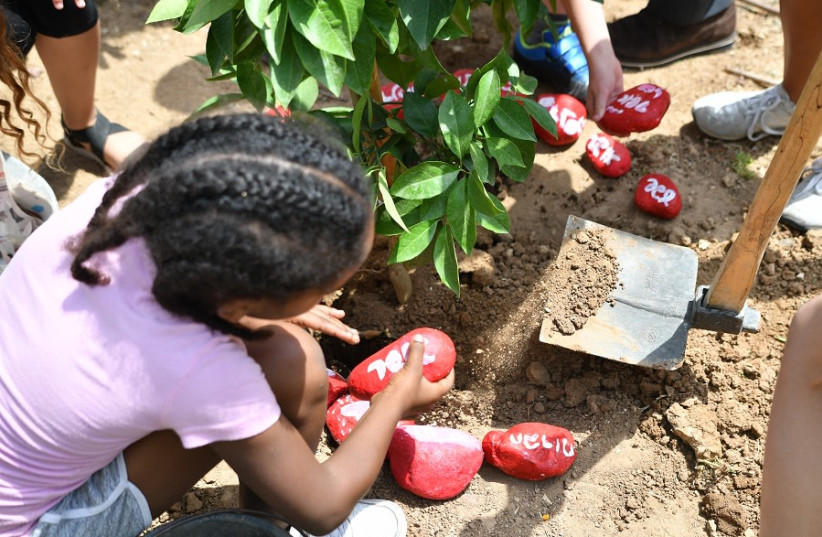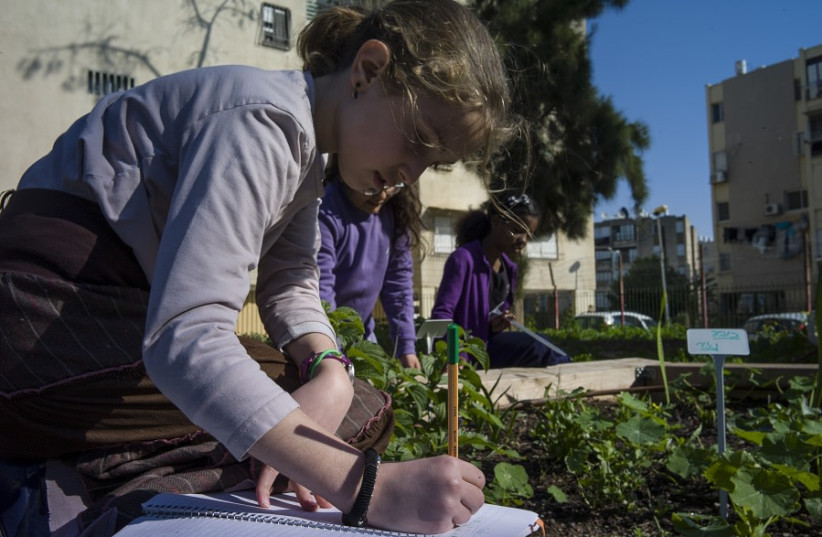Sometimes the best place to learn is outside in the garden. The Ministry of Education's “Green Learning” program, developed in partnership with The Asper Foundation and JDC-Israel, utilizes gardens and innovative curricula to develop crucial life skills and advance academic learning beyond the classroom for students in Israel’s geo-social periphery. It is a prime example of an interdisciplinary educational approach: excellent pedagogy, sustainability, and the development of experiential learning spaces.
"When children understand the relevance of different subjects to their lives, they learn more, and use that information in plotting their own futures. This is called 'agency,' and many of today's schools struggle to provide agency to children," notes Adi Drenger Marom, Program Director at Ashalim, JDC-Israel's social mobility division. "The Green Learning program provides opportunities to develop children's agency. It makes learning relevant and meaningful, sparking a passion for learning that will accompany them throughout their lives."
Miki Arian Kedarya, Learning Environment Development Supervisor of the Ministry of Education's Development Department, noted, "A green learning space is an avenue for authentic experiential learning and allows for a fruitful dialogue between a child and his environment. Such a space undoubtedly influences children emotionally and strengthens their sense of belonging and well-being of all communities that use it: students, educational staff and the community."

Inspired by a visit by Moses Levy, Executive Director of The Asper Foundation, to The Edible Schoolyard, a school-based program in Berkeley, California, The Foundation asked JDC to take the lead on Israel’s first outdoor learning initiative, the “Green Learning” program. The Asper Foundation, JDC, and numerous Ministry of Education departments, including its Elementary School Division, Sustainability Field, and Development Administration's Learning Environment Development section, operated as full partners in the project.
The initiative utilizes gardens and innovative curricula to significantly broaden access to "outside of the classroom" frameworks for children of all backgrounds. Thus, a garden is used as a platform to learn about science, literature, history, Jewish studies, leadership, entrepreneurship, nutrition, and health. In addition, parents and community members are able to take a vested interest in the garden, turning it into a community anchor.
Green Learning has impacted over 4,000 children and 400 teachers since its inception. The initiative has developed teacher training modules and is launching a website with complete curricula and educational and training content for the continuation of the program, as part of the program development process with the Ministry of Education. This platform will include all the learning tools and content designed over the years and will facilitate future developments and collaboration, enabling educators and children to benefit for years to come.
“When I first heard about Green Learning, I did not believe I could teach my students outdoors”, says Nariman, a teacher from Kfar Kassem. “After attending the training, I realized that not only could I teach well, my students loved the lessons and absorbed the material with no problem. Outdoor classes are now their favorite, and in fact, it’s even easier for me to teach outside than inside the classroom.”
"When we see the heights that JDC and the Ministry of Education have taken this program to we are absolutely thrilled," said Gail Asper, President and Trustee of The Asper Foundation. "We are even more excited to be continuing our long-term partnership with JDC with the STEM for All program which will impact tens of thousands of children in Israel's periphery."

The STEM For All program aims to increase the STEM skills (Science, Technology, Engineering and Mathematics) and creative-thinking processes – giving them STEM agency - of elementary school students in Israel’s periphery as a means of enhancing their future job prospects and career mobility. STEM For All engages low-income elementary school students in active learning and building 21st century skill sets, providing them with problem-solving skills that will empower them to succeed, both in high school and later on as adults in the job market. As part of the program, teachers of all subjects will receive training for comprehensive problem-solving pedagogy, STEM subject curricula will be updated; and project-based learning, which promotes acquisition of cognitive, personal and interpersonal skills, will be encouraged. The results of a pre-pilot program showed potential for great success.
STEM for All is part of JDC-Israel's strategy, which identifies and develops responses to emerging social issues and trends. One of today's major challenges is increasing the social mobility of vulnerable children in Israel's geo-social periphery. This would allow all, regardless of socioeconomic background, to access opportunities to succeed, in all stages of life from birth to early employment - in the home, at school, in higher education and the job market, and in the community.
STEM for All is one of JDC-Israel's main vehicles towards this goal. "We are committed to moving the needle in learning for the 21st century and improving STEM education for children in Israel's geosocial periphery is key," said Dr. Ariel Levy, Director of JDC-ASHALIM. "Together with the Ministry of Education, STEM for All is the 'next big thing.' We are excited to partner with the different Ministry divisions and departments, as well as The Asper Foundation, to make a significant impact throughout Israel."
"Helping children at risk from Israel's periphery fulfill their potential has been one of The Asper Foundation's major priorities for the past 20 years," said Gail Asper. "We are privileged and excited to be embarking on a new partnership with JDC-ASHALIM with the STEM for All program, to make a real and significant impact."
This article was written in cooperation with JDC
